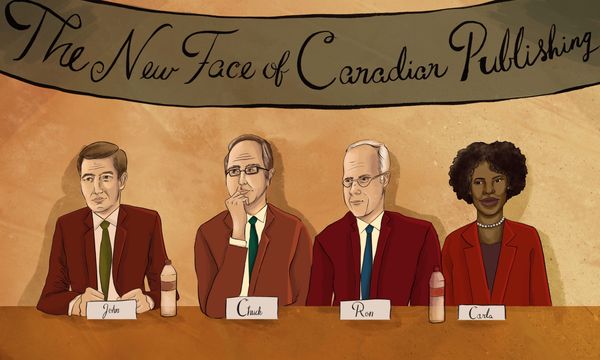Tokenism vs. Inclusion
By Jael Richardson & Illustration by Chelsea Charles
Last month, I wrote a piece about my frustrations with the lack of diversity in Canada’s publishing industry. In the comments, it was mentioned that while some folks are trying to make improvements, many people don’t know the difference between tokenism and inclusion. It got me thinking. So I put this list together comparing tokenism to inclusion – which should be the goal when it comes to diversity.
1. Tokenism is an after-thought. Tokenism is driven by a desire to cover up or minimize a systemic problem. As a result, tokenism often involves looking for a solution that’s quick or easy.
Inclusion starts at the core of an organization. It is a long-term, forward-thinking approach that starts at the top and forms the core and involves all aspects of the organization. It takes work. It is almost never easy. But it is always for good.
2. Tokenism involves mandates and check boxes. It is often ignited by a mandate for diversity that’s driven by an outside source, like a competitor or a funding body. As a result, it tends to be driven by a desire to check off boxes or cover a "trend" or "popular issue" without acknowledging personal bias and without reflecting on problematic structural or systemic issues. Are there no diverse folks on your planning team because they don’t exist or because you don’t have friends who fall into this category?
Inclusion involves recognizing how your experience and comfort levels might shape your relationships and programming. It involves actively setting out not only to improve your program or list but to improve yourself and your reading list.
3. Tokenism turns diverse writers into diversity experts, exclusively. When organizers or marketers promote their diversity but fail to emphasize their expertise as writers, it devalues the writer’s skill and insight. This also happens when diverse authors are brought to panels to talk about diversity, but they are not promoted in the marketing and promotional push.
Inclusion recognizes that there are great, unknown authors from marginalized communities who can teach others about writing. Inclusion acknowledges that while they may not be known yet, they deserve to be known. Inclusion takes the position that promoting those voices and elevating their recognition is an important effort to engage in that benefits the writer and the readers.
4. Tokenism occurs when writers are “colonized.” It happens when personal preferences for voice and narrative, for example, are based on a colonial approach to how stories are told (ie.- a linear narrative or narrative/dialogue that avoids dialects like patois or demands all “foreign” terms be translated into English). It’s based on the belief that writing should be easier for an exclusive, “mainstream” reader.
Inclusion celebrates writers from marginalized communities by allowing stories to unfold in new and different ways. It challenges readers to consider what’s familiar and unfamiliar, to learn new things about themselves and others.
Your CanLit News
Subscribe to Open Book’s newsletter to get local book events, literary content, writing tips, and more in your inbox
5. Tokenism also occurs when one individual serves as the voice of an entire group. Instead of having multiple writers from a particular community, only one writer from that community is celebrated. This becomes particularly dangerous when it occurs over a long period of time.
Inclusion recognizes that in marginalized communities there are many ways of seeing a particular topic or issue. Inclusion sets out to introduce readers to multiple voices from marginalized communities on a continual basis.
How do you make the transition?
• Have more diverse staff/interns/programmers. Invite a greater range of perspectives to the planning table. If it’s a formal position, consider lived experience as an important quality in an applicant/candidate/team member and include that in the application. Don’t compromise talent, but if you’re not getting the talent, ask why. Consider how to develop a more diverse and skilled base to pool future talent from. Who can you partner with to help you achieve that?
• When it comes to programming, start with the hardest voices to find, not the easiest. Look at who you’ve missed in the past, and make them a priority.
• Ask hard and awkward questions of yourself and allow people you trust to help you through them. What are you reading that may limit your own knowledge? What magazines or events could you read or attend to grow that knowledge? Don’t just email a diverse person and say help me find people like you. Do the research. Follow people on social media and engage with organizations that will provide on-going information that can help minimize your blindspots.
• Do not do nothing. Start small or go big but don't do nothing.
The views expressed by Open Book columnists are those held by the authors and do not necessarily reflect the views of Open Book.
Jael Richardson is the author of The Stone Thrower: A Daughter's Lessons, a Father's Life, a memoir based on her relationship with her father, CFL quarterback Chuck Ealey. The book received a CBC Bookie Award and earned Richardson an Acclaim Award and a My People Award as an Emerging Artist. A children's book called The Stone Thrower came out with Groundwood Books in 2016. Her essay "Conception" is part of Room's first Women of Colour edition, and excerpts from her first play, my upside down black face, are published in the anthology T-Dot Griots: An Anthology of Toronto's Black Storytellers. Richardson has an MFA in Creative Writing from the University of Guelph, and she lives in Brampton, Ontario where she serves as the Artistic Director for the Festival of Literary Diversity (The FOLD).



